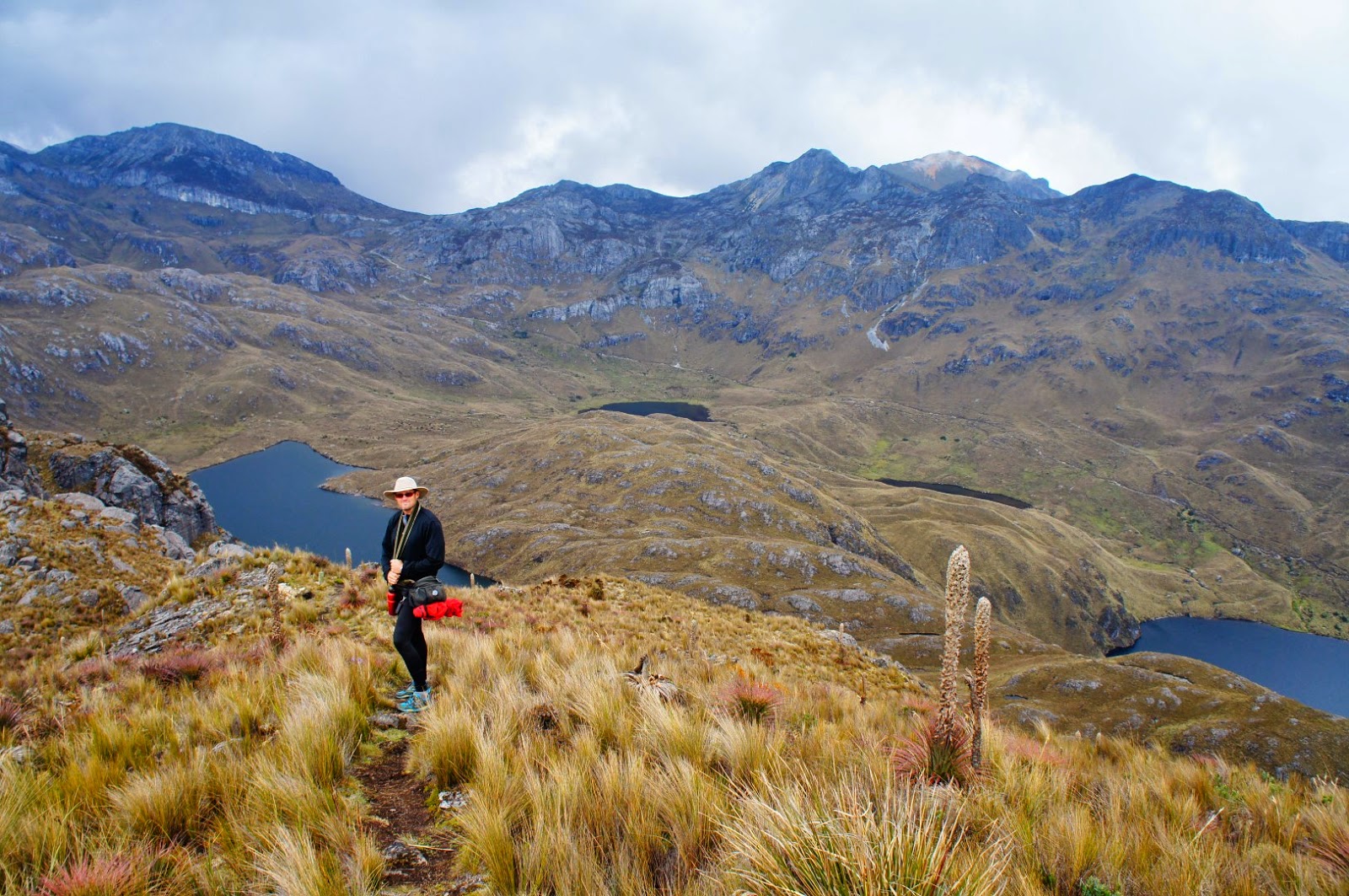Most people wouldn't call Cuenca a "big city", but for our standards, it is plenty big, with a population of over 400,000. We usually don't enjoy the concrete jungle of cities, so we were pleasantly surprised by Cuenca. Cuenca is clean, with abundant green spaces, and multiple rivers running through town.
.JPG) |
| One of the many pedestrian bridges over the river running through Cuenca |
There are tons of great restaurants, too. I think we hit an all time record - going out to dinner 4 nights in a row. Per usual, we sought out some things that we don't get very often - pizza and microbrew beer. We visited La Compania, a micro-brewery that serves beer in giant 1 liter mugs (we wish we had brought our camera that night). Our favorite though, was the pizza at Fabiano's Pizza. We devoured a huge, delicious family-sized pizza with 4 drinks for only $20.
 |
| The sky turned an amazing blue color as we walked on the outskirts of Cuenca |
Our camping spot in Cuenca was actually a couple of miles from downtown. The campground, Cabañas Yanuncay, was a good place for Scott to do some maintenance on the truck - oil change, chassis lube, and air/fuel filter change. Pictured below, El Tigre takes a breath of fresh air and oil, while exploding his contents onto the soft grass for a little house cleaning. Here, we enjoyed the crisp, sunny weather, punctuated by predictable afternoon downpours.
 |
| Our chore supervisor at Cabañas Yanuncay |
Near Cuenca (only 10 miles!!!), is a vast, spectacular national park called El Cajas. It took us forever to figure out why it was called "El" Cajas Parque Nacional instead of "Las" Cajas Parque Nacional. If you don't know why either, your Spanish is on par with ours. Like the other amazing, free national parks in Ecuador, this one did not disappoint. The park is huge, with lakes everywhere and an eerie landscape that we have never experienced before. We spent a couple of days hiking, climbing one of the zillions of peaks, and taking in the cold climate, sleeping at 12,000 feet.
We were getting close to the end of our 90-day visa, so we needed to point El Tigre south towards Peru. We read in our guidebook about an "off-the-beaten-track" town, Jima, that was nestled below some "green", climbable peaks. On the map, it appeared to be a good stopping point on our way south. It turned out to be a serious bust. It was a 10-mile detour on a steep, bumpy road that took us an hour to drive. The peaks in town would've been awesome if you had flown in from, say, Kansas, but not when you've been touring the volcanoes further north.
Jima is a very small town, and everywhere we walked, people stared at us even more than usual. I felt a bit overwhelmed by the attention. A couple of people stopped to talk to us in the town square, attempting to teach us the history of Jima. Really, they wanted to know how the hell we found the town. We spent the night parked on the town square, and while we were hanging in the truck, a funeral procession formed behind us. At first, we thought it might be a celebration that we would enjoy watching. Our hearts sank when we saw the tiny casket, carried by young boys wearing all white. We snuck a picture through our dusty, rear window while they were preparing for the procession (see below).
After a 6am wake up knock on the truck - as the Jima locals were setting up for the Sunday market - we got an early start towards Parque Nacional Podocarpus. Podocarpus was our last visit to one of Ecuador's amazing, free national parks. We camped at the ranger station, perched on a ridge inside the park, for two nights. We were the only people there - blissfully quiet. The mirador loop was the most physically demanding 5k hike ever. With a vertical gain/loss of probably 3000+ feet, and scrambling on our hands and feet, it took us almost 4 hours! We made it back in time for a chilly happy hour and alpen glow. Next up, PERU!
 |
| This hike was hard! |
 |
| Podocarpus National Park |






1 comment:
Hey Guys, the name of Parque Nacional "El Cajas" doesn't come from Spanish (cajas=boxes), but from the Kichwa word "caxas" which means "frío" in Spanish ("cold" in English). "El Cajas" literally means "The Cold" and that is why we don't use the plural pronoun "Las" here ;-) Kichwa was one of the pre-colonial languages of Ecuador and is still widely spoken in our indigenous communities. Source: I'm Ecuadorian :-)
Post a Comment